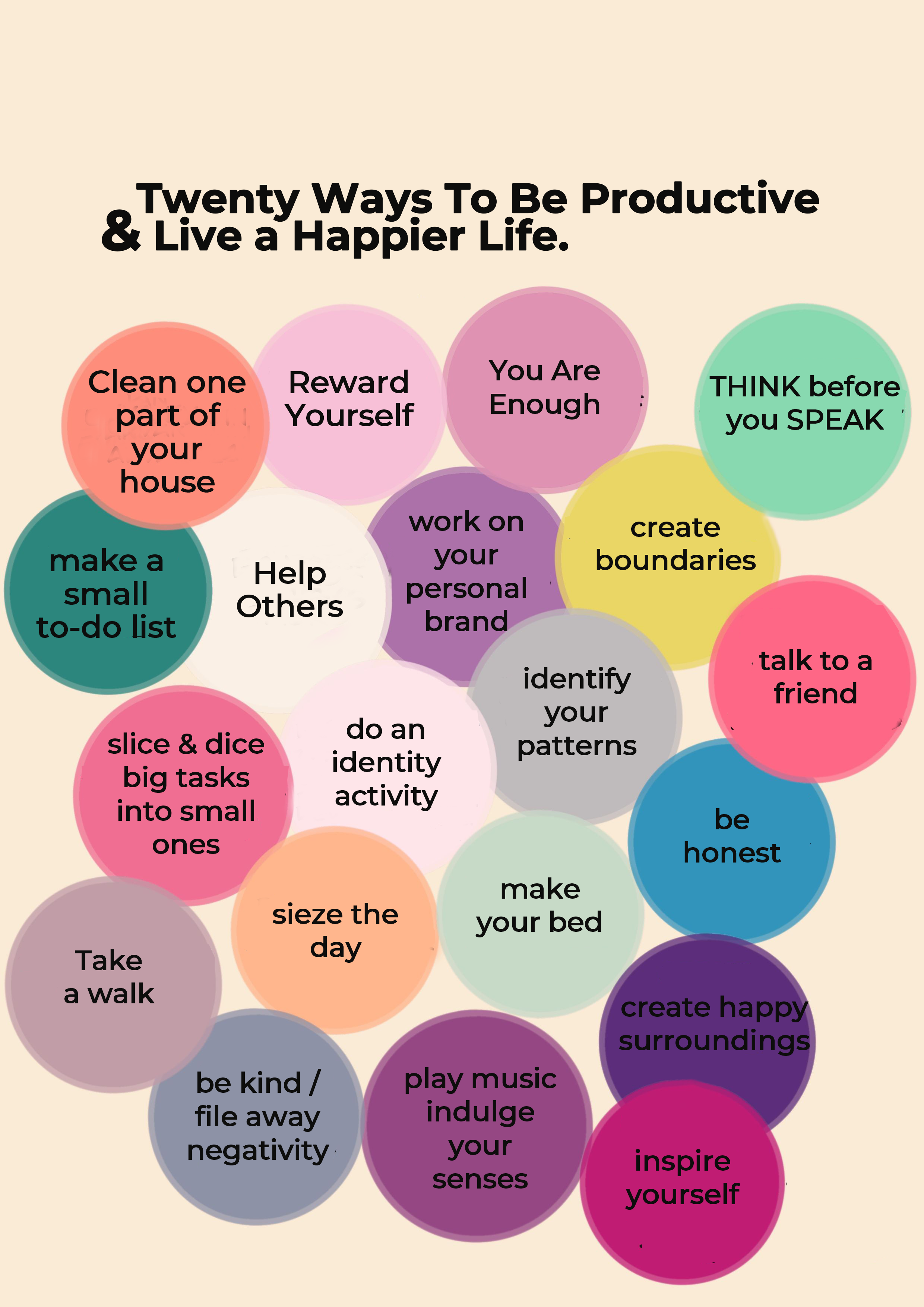Twenty Ways to Be Productive & Live a Happier Life.
How can you effectively cultivate happiness and productivity within yourself? This November, I invite you to participate in the "Happy & Productive" Challenge, where each day I will delve into 1 of the 20 insightful tips aimed at fostering a more fulfilling and successful life. What factors contribute to your personal happiness and productivity? By joining me in this November Challenge, we can collectively embark on a journey toward enhanced well-being and increased effectiveness.
By Liz Ash.
November 2023 is all about Living a Happier and More Productive Life.
01 Inspire Yourself: Your first task this November is to explore the sources of inspiration in your life. These can range from captivating visuals, vibrant colors, or even a melodic composition. I encourage you to compile a personal list of these inspirational elements. By doing so, you will have a reservoir to draw from whenever you are feeling low. As someone who has personally experienced the challenges of depression, I can attest that discovering what genuinely uplifts your spirit and surrounding yourself with such influences will undoubtedly enhance your motivation in various aspects of your life, be it work, chores, or relationships. Personally, I have created a Gallery Wall in my workspace within my living room, and every time I glance at it, I feel a sense of accomplishment and joy. The transformation it has made compared to its previous state is truly remarkable. Therefore, I challenge you to identify your unique sources of inspiration and intentionally incorporate them into your life space so that you may encounter them regularly.
02 Create Happy Surroundings In order to cultivate a harmonious living environment, it is essential to embark on the process of decluttering and organizing our homes. The act of decluttering allows us to rid our spaces of unnecessary items, creating a sense of tranquility and serenity. By removing clutter, we create more physical and mental space, enabling positive energy to flow freely throughout our surroundings. This practice serves as a transformative journey, not only improving the aesthetic appeal of our homes, but also enhancing our overall well-being. Embracing the art of decluttering empowers us to curate a space that supports mindfulness, productivity, and a deep sense of contentment. Through intentional curation and careful consideration of our possessions, we can create a sanctuary that reflects our true selves and promotes a fulfilling and joyful lifestyle. I challenge you to remove one item that doesn’t make you happy in each of your spaces: rooms in your home, your car, your balcony or backyard. An item a day. At the end of the week you will have 7 items that brought you down, out of your environment, and then you should praise yourself for this win!
The semicolon has become a symbol for those who have battled depression, anxiety, and other mental health issues; it is a reminder that even though their story could have ended there, they chose to continue on. In the same way, a semicolon in a sentence is a place you could end but continue on. Right now, we’re suffering a Great Depression, and this challenge is my way of trying to contribute more positivity into our society while actually creating tangible productive and happiness tips.
03 Make Your Bed Perhaps you’ve heard this one before and with good reason. Making the bed may seem insignificant, but it sets the tone for the rest of the day. You’re more likely to finish the rest of your tasks if you’re already productive before you’ve even had breakfast. As a result, you’ll most likely be driven to improve your everyday practice in other areas of your life. Making your bed can also serve as a reminder that the simple things/tasks in life matter too. According to experts, making your bed is one of the easiest daily success wins to adopt. It sets in motion a chain reaction of other productive behaviors. Did you know it also has health benefits? Spreading your sheets out exposes dust mites to daylight and clean air, causing them to dry up and perish, whereas an unmade bed does the opposite. This is such a key to my own personal happiness, looking at my room when my bed is made, fills me with joy and makes the room look much more expansive.
04 Indulge Your Senses: Human beings heavily rely on their senses to comprehend and navigate the world. Through touch, taste, smell, sight, and hearing, we shape our understanding of the environment and experience the joy of a sunset, a delicious meal, or the warmth of a loved one's embrace. Yet, the post-COVID era has presented disruptions to our sensory perception, working from home limits our sensory experiences to primarily touch (typing), sight, and hearing (Zoom meetings), depriving us of the full spectrum of sensations. Consequently, these disruptions have the potential to lead to confusion and disorientation, underscoring the importance of employing strategies to stimulate our senses. By engaging with scents we enjoy - for instance, Lilac is calming or playing background music - we can boost our overall well-being and quality of life, enhancing our moods and happiness.
“The Sun. The Moon. The Truth.” -Confucius
05 Be Honest Someone once said “We are as sick as our secrets” and I believe in that sentiment. The things we hide, from even ourselves, still live in our subconscious, so I think being honest with ourselves, and maybe a friend in the case of a secret is invaluable for our mental health. Being honest can have a positive impact on your mental health in many ways. One of the most significant benefits of honesty is that it can help you build a more authentic and fulfilling life. When you’re truthful with yourself and others, you’re living in accordance with your values and beliefs, which can give you a sense of purpose and direction in life. Being honest with yourself can also help you identify areas of your life that need improvement, and take action to make positive changes. Another benefit of honesty for mental health is that it can improve your relationships with others. When you’re honest with the people in your life, you build trust and respect. This can lead to stronger and more meaningful relationships, which are essential for good mental health. Honest communication can also help you resolve conflicts with others more effectively, which can reduce stress and anxiety.
06 Seize the Day Carpe all Day "Carpe" has become a daily mantra, guiding my actions and mindset for my November challenge. Unfortunately, the true essence of the phrase "Carpe diem" has been lost in translation. Roman Krznaric, an Australian philosopher and author of "Carpe Diem Regained," aptly describes this mistranslation as an existential crime that has largely gone unnoticed. Krznaric raises concerns about how the concept of seizing the day has been grossly misconstrued, emphasizing a self-centered #YOLO-infused, Just Do It, instant-gratification-driven culture. It's time to reassess our understanding. Instead of "seizing" the day, let's pause and reevaluate. The actual translation of Carpe Diem holds a deep, sensual, and love-filled meaning: embracing each moment as if plucking a delicate flower. It urges us to breathe in the fleeting scent, feel the plush petal, and fully be present in each passing moment. It's time to let go of the notion of "seizing" and instead focus on truly experiencing and cherishing every moment. So, today I embrace the philosophy of carpe all day as let's immerse ourselves in the beauty and richness that each moment holds, cultivating a sense of mindfulness and appreciation for the present. After all, we only ever have the present……What are you doing now?
07 Take a Walk Boost your mood as you're strolling down the sidewalk, earbuds in, bopping your head to your favorite tunes. The sun's shining, a gentle breeze caresses your face, and you can't help but feel alive (ok, this may be an exaggeration but let's roll with it). Did you know that these leisurely walks are doing wonders for your mind and body? Walking, my friends, is the secret to unlocking a happier, healthier you in this fast-paced JUST-DO-IT, INSTA-FACE world we live in. Let's talk about the mental benefits first. Walking is like hitting the reset button on your brain. When you step out and start moving, those deep breaths you take help clear your thoughts and melt away stress. It's like meditation in motion. You'll find yourself thinking more clearly, feeling more focused, and embracing a sense of calm. If it works for me, I can only hope it will work for you. Walking releases endorphins just in case you need another reason to lace up those shoes. But seriously, if I listed out all the benefits of just a 10-minute walk, we’d have paragraphs of content. So I challenge you to take a 10-minute walk! Reap the benefits without incurring any cost. Join me as I challenge myself every day this month so I can live a happier and more productive life.
08-09 Slice and Dice Big Tasks into Smaller Ones/ Make Smaller To Do Lists. Feeling overwhelmed by your to-do lists? Make them smaller. I tend to put WAY too much on mine and it’s a negative self-fulfilling prophecy. So simplify them by de-cluttering first. Just like you’d declutter your house before organizing, do the same thing with your daily to-do list. Move a few large tasks from your to-do list today and instead break down bigger items into smaller milestones. Do the same thing with your environment: throw out one thing from each room in your house. Watch the satisfaction you feel when you combine de-cluttering with simplification. You’ll feel accomplished and productive. This is the key to conquering bigger tasks with ease. Slice and Dice my friends while asking yourself daily: to-do and not to-do (Shakespeare is still relevant).
10-11 Whooo are you? Unleash the power of personal branding and embrace your true identity. In just five minutes, this identity exercise will leave a lasting impact. Your personal brand, encompassing the way you think, describe, and present yourself across platforms, shapes your digital reputation. In today's interconnected world, your identity is no longer confined to individual platforms, but is collectively presented to the world. With AI and potential audiences like HR departments, recruiters, clients, and fans, your reputation holds immense value. So, consider the diverse aspects of your identity, from roles to traits and experiences. Take a moment to identify three facets and uncover their personal significance. Let go of curated narratives and embrace authenticity, for your true self is far more captivating.
Give your hands to serve, and your hearts to love - Mother Teresa
12 Help Others. Someone once said We can only keep what we have by giving it away. I don’t remember who said this, but I remember the impact this philosophy has had on my being every day since. Everyone leaves something behind when they touch it. A child or a book or a gift or a homeless shelter or a pair of shoes. Or a garden planted. Something your hand touched in some way has traces of your spirit, your kindness, the essence of you, and when people look at that tree or that flower you planted, you're there. It doesn't matter what you do so long as you change something from the way it was before you touched it into something that's better after you take your hands away. The difference between the man who just cuts lawns and a real gardener is in the touching, he said. The lawn-cutter might just as well not have been there at all; the gardener will be there a lifetime. This is a twist on Ray Radbury’s quote but I think it’s the perfect application of how we can keep what we have by giving it away. Help someone today, no favor too small, perhaps someone drops something and you pick it up. This is the small kind of wonder that creates epic thunder. Science has already proven that emotions can spread between people so lift your head today and help someone. Helping others is the hallmark of Humanity, after all.
13 Talk to a Friend. Experience the transformative power of personal connection by sharing your thoughts, experiences, or facts with a friend, priest, or anonymous listener. What we keep hidden within our inner world can break down barriers between our true selves and objective reality if you give it a chance. The deeper and darker the secret, when revealed, conversely lifts a greater weight and provides more light to our inner being. So benefit yourself, improve yourself and empower yourself to be more honest, pure, and present. Witness the myriad health benefits as the weight of secrets lifts off of your proverbial shoulders. This very simple act is so important to our own existence and ability to live in the now. So this week, while you give thanks, embrace the present moment, release what you've been carrying, and let the power of personal connection transform your life. It will. Remember we are as sick as our secrets and the present is a gift. Things make of a man whatever he makes from them.
14 Create Boundaries. Setting personal and professional boundaries is crucial for maintaining a healthy and balanced life. Boundaries define what is acceptable and what is not in our interactions, acting as safeguards against exploitation and ensuring self-care, well-being, and healthy relationships. Effective communication of boundaries involves clear and assertive communication, consistency, self-awareness, and practicing self-care. Examples of boundaries include physical, emotional, time, and space limits. By setting and communicating boundaries effectively, we establish respect, trust, and understanding with others, promoting personal growth and happiness.
What are Boundaries? Boundaries can be defined as the physical, emotional, time, and space limits we set for ourselves to create a sense of safety, security, and respect. They are a fundamental part of self-governance, helping us understand our own needs and ensuring that they are met in relationships and interactions with others. Boundaries act as a protective barrier against invasion, manipulation, and exploitation, giving us control over our personal and professional lives.
Reasons Why Boundaries Are Necessary
Self-Care and Well-being: Boundaries are essential for ensuring our own self-care and well-being. By setting limits on our time, energy, and emotional availability, we prevent burnout, fatigue, and mental and emotional exhaustion. When we prioritize our own needs and set boundaries to protect them, we become better equipped to support others effectively.
Respect and Dignity: Setting boundaries is an expression of self-respect and demands respect from others. By creating clear expectations of how we want to be treated, we protect our dignity and preserve our self-worth. Boundaries ensure that our personal values are upheld and that we are not subjected to harmful or disrespectful behavior.
Maintaining Healthy Relationships: Boundaries are the cornerstone of healthy relationships, both personal and professional. They help establish a framework of mutual respect, trust, and understanding. When boundaries are communicated effectively and respected by both parties, relationships are more likely to thrive and flourish.
Preventing Exploitation and Abuse: Boundaries act as a deterrent against manipulation, exploitation, and abuse. They create a safe space for personal growth and protect us from toxic relationships or situations where our well-being is compromised. Boundaries can help identify and rectify imbalances of power and maintain a healthier balance between our own needs and the needs of others.
How to Communicate Boundaries Effectively
Self-Care and Well-being: Boundaries are essential for ensuring our own self-care and well-being. By setting limits on our time, energy, and emotional availability, we prevent burnout, fatigue, and mental and emotional exhaustion. When we prioritize our own needs and set boundaries to protect them, we become better equipped to support others effectively.
Respect and Dignity: Setting boundaries is an expression of self-respect and demands respect from others. By creating clear expectations of how we want to be treated, we protect our dignity and preserve our self-worth. Boundaries ensure that our personal values are upheld and that we are not subjected to harmful or disrespectful behavior.
Maintaining Healthy Relationships: Boundaries are the cornerstone of healthy relationships, both personal and professional. They help establish a framework of mutual respect, trust, and understanding. When boundaries are communicated effectively and respected by both parties, relationships are more likely to thrive and flourish.
Preventing Exploitation and Abuse: Boundaries act as a deterrent against manipulation, exploitation, and abuse. They create a safe space for personal growth and protect us from toxic relationships or situations where our well-being is compromised. Boundaries can help identify and rectify imbalances of power and maintain a healthier balance between our own needs and the needs of others.
Examples of Boundaries
Physical Boundaries: This involves setting limits on physical touch or personal space. For example, you may establish a boundary that prohibits unsolicited touching or hugging without consent.
Emotional Boundaries: Emotional boundaries involve limits on sharing personal information or the emotional burden you can handle. For example, you may decide not to discuss certain sensitive topics with certain people or to limit the amount of emotional support you can provide at a given time.
Time Boundaries: Time boundaries involve setting limits on the amount of time you spend on certain activities or with certain people. For instance, you may establish a boundary to set aside dedicated time for self-care or family.
Space Boundaries: Space boundaries refer to the physical environments where you need to create limits. For example, you may declare certain areas of your home or office as personal spaces not to be invaded without permission.
Conclusion: Setting personal and professional boundaries is a vital element in maintaining a healthy and balanced life. Boundaries serve as safeguards against exploitation, ensure our self-care and well-being, and help build and maintain healthy relationships. By communicating boundaries effectively, we can establish a framework of respect, trust, and understanding with others. Remember, boundaries are not selfish; they are essential for growth, self-preservation, and overall happiness.
15 De-Clutter, Organize and/or Clean One Room. Today’s motto is “So Fresh and So Clean.” Research has uncovered a wealth of evidence showcasing the remarkable impact that cleaning has on our mental health. It's not just about tidying up; it's about gaining a sense of control over our surroundings and immersing our minds in a soothing, repetitive activity. Consider decluttering, organizing, and cleaning as types of therapeutic dance for our brains. Cleaning has been proven to boost our mood, leaving us with a delightful sense of accomplishment and satisfaction. It's like a burst of sunshine on a gloomy day. So, why does cleaning have this magical destressing effect? Let me enlighten you with a glimpse into the marvelous benefits of cleaning and decluttering one room in your home or bustling office.
Firstly, let's talk about the impact on our physical health. A study conducted by the brilliant NiCole Keith, PhD, a research scientist and professor at Indiana University, revealed that individuals within a clean room tend to be healthier than those dwelling in chaotic, cluttered spaces. Now, let's delve into the psychological realm. When life often feels like a wild rollercoaster ride, and so much uncertainty looms over us in 2023, cleaning, organizing, or de-cluttering becomes our superhero cape. It empowers us to regain control and assert mastery over our environment. In fact, a study from the University of Connecticut discovered that during times of high stress, people instinctively turn to repetitive behaviors like cleaning. It's like a soothing balm for our souls amidst the chaos. But that's not all.
Clutter and disorganization can be major distractions, hindering our ability to focus and complete other tasks. It's like being trapped in a never-ending maze. So, if you find yourself yearning to clean and declutter when stress strikes, it's your mind and body's way of seeking order and harmony in your surroundings. But don’t overwhelm yourself with a whole home; one room at a time is key here to staying in control and being able to complete something - breaking big tasks into small ones. The more open any space becomes, the more clean air and energy can enter and spread within it.
If done routinely. Remember when stress strikes, it can often feel overwhelming and chaotic, leaving us searching for a sense of control. It's during these moments that we will pause through daily repetition and we learn to channel that stress and the urge to clean and declutter arises, almost like a natural instinct. By tidying up our physical space, we create a semblance of order and harmony, providing a much-needed respite for our mind and body.
It's as if the act of cleaning becomes a therapeutic escape, allowing us to regain a sense of calm amidst the chaos of 2023. So, next time you find yourself reaching for the broom or organizing your closet during a stressful period, embrace it as your mind and body's way of seeking solace and restoring balance. And don’t put too much pressure on yourself, one room at a time, one space at a time, is an accomplishment; you don't need to clean your whole house. If anything this November, I’m trying to change my patterns and look at what I do, instead of what I don’t do. So celebrate the small wins. One moment at a time.
T.H.I.N.K. artwork by Liz Ash
16 Think Before You Speak. Someone devised this brilliant acronym, T.H.I.N.K., as a reminder to consider before speaking. It's remarkable how many people fail to think before they speak in conversations. I must admit, I am also guilty of this at times. That's why I'm striving to fully incorporate this lesson into my life. Let's break down the acronym:
T stands for "Is it true?"
H stands for "Is it helpful?"
I stands for "Is it inspiring or enlightening?"
N stands for "Is it necessary?" and
K stands for "Is it kind?"
This acronym serves as a valuable guideline for effective communication. Engaging in conversation is a fundamental aspect of being human, but it loses its value if it becomes tainted with ulterior motives, negative emotions, or manipulation. Our words should be worth speaking only when they align with truth and authenticity. We have already learned how speaking the truth can lead us closer to ourselves and the present moment. Similarly, we should strive for more meaningful, constructive, and honest conversations. Another useful tool is the anagram LISTEN: SILENT. When we truly listen, we set aside our thoughts about what to say next and embrace silence. I make an effort each day to remind myself of these acronyms and anagrams. It's not easy in a world consumed by drama and gossip, but I firmly believe that avoiding unnecessary drama is crucial. Let's focus on cultivating more positive and meaningful interactions instead.







